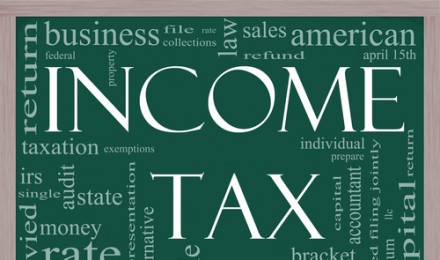As December 31, 2012 approaches, many Americans question how their finances will be impacted if the country goes off the fiscal cliff. Talk of the fiscal cliff has dominated headlines for the past few months. And while some people felt that both political parties would have reached an agreement long before the end of 2012, this hasn’t been the case.
Going off the fiscal cliff will trigger higher taxes and spending cuts which can have a major impact on our already shaky economy. On one hand, higher taxes and spending cuts increase revenue to reduce the federal budget deficit. But with a reduction in household income, a recession seems inevitable.
To understand exactly how the fiscal cliff may impact your pocket, you need to grasp the main components.
1. Expiration of the Bush Tax Cuts
The largest component of the fiscal cliff – the expiration of the Bush tax cuts – will result in a higher income tax rate for the majority of Americans. These temporary tax cuts were enacted by President Bush in 2001 and 2003, and they essentially lowered the amount each taxpayer owed in federal taxes. Originally set to expire at the end of 2010, President Obama granted a two-year extension. But if the country goes off the fiscal cliff, income tax rates will increase from 10, 15, 28, 33 and 35 percent to 15, 25, 28, 36 and 39.6 percent. What does this mean? As a whole, each household will pay (on average) and additional $3,500 in income taxes per year.
The expiration of the Bush tax cuts also result in higher payroll taxes, in which the current withholding rate of 4.2 percent increases to 6.2 percent. Estate taxes rise to 55 percent from 35 percent. Currently, estate taxes only apply to inheritances over $5 million. However, inheritances over $1 million will be subject to higher taxes if we go off the fiscal cliff.
Taxes on dividends will increase to 39.6 percent from 15 percent. Taxpayers are currently taxed between 5 and 10 percent on capital gains. This will increase to between 10 and 20 percent beginning January 1, 2013. Other taxes affected by the expiration of the Bush tax cuts include the child tax credit and the alternative minimum tax.
2. Spending Cuts
In an effort to reduce the federal budget deficit, automatic spending cuts are scheduled to take effect on January 1, 2013. These include reductions in defense and discretionary spending. If spending cuts take effect, $55 billion will be cut from defense spending over the next decade. This cut does not impact current war costs or veterans’ benefits. Additionally, discretionary spending cuts include a $55 billion slash in areas, such as education, public safety and law enforcement.
3. Unemployment Benefits
With the American Recovery and Reinvestment Act, unemployment benefits were extended from 27 weeks to 99 weeks. This change occurred in February 2009. As of January 1, 2013, these benefits revert to the original 27 weeks, resulting in the loss of unemployment compensation for many jobless Americans.
As December 31, 2012 approaches, many Americans question how their finances will be impacted if the country goes off the fiscal cliff. Talk of the fiscal cliff has dominated headlines for the past few months. And while some people felt that both political parties would have reached an agreement long before the end of 2012, this hasn’t been the case.
Going off the fiscal cliff will trigger higher taxes and spending cuts which can have a major impact on our already shaky economy. On one hand, higher taxes and spending cuts increase revenue to reduce the federal budget deficit. But with a reduction in household income, a recession seems inevitable.
To understand exactly how the fiscal cliff may impact your pocket, you need to grasp the main components.
1. Expiration of the Bush Tax Cuts
The largest component of the fiscal cliff – the expiration of the Bush tax cuts – will result in a higher income tax rate for the majority of Americans. These temporary tax cuts were enacted by President Bush in 2001 and 2003, and they essentially lowered the amount each taxpayer owed in federal taxes. Originally set to expire at the end of 2010, President Obama granted a two-year extension. But if the country goes off the fiscal cliff, income tax rates will increase from 10, 15, 28, 33 and 35 percent to 15, 25, 28, 36 and 39.6 percent. What does this mean? As a whole, each household will pay (on average) and additional $3,500 in income taxes per year.
The expiration of the Bush tax cuts also result in higher payroll taxes, in which the current withholding rate of 4.2 percent increases to 6.2 percent. Estate taxes rise to 55 percent from 35 percent. Currently, estate taxes only apply to inheritances over $5 million. However, inheritances over $1 million will be subject to higher taxes if we go off the fiscal cliff.
Taxes on dividends will increase to 39.6 percent from 15 percent. Taxpayers are currently taxed between 5 and 10 percent on capital gains. This will increase to between 10 and 20 percent beginning January 1, 2013. Other taxes affected by the expiration of the Bush tax cuts include the child tax credit and the alternative minimum tax.
2. Spending Cuts
In an effort to reduce the federal budget deficit, automatic spending cuts are scheduled to take effect on January 1, 2013. These include reductions in defense and discretionary spending. If spending cuts take effect, $55 billion will be cut from defense spending over the next decade. This cut does not impact current war costs or veterans’ benefits. Additionally, discretionary spending cuts include a $55 billion slash in areas, such as education, public safety and law enforcement.
3. Unemployment Benefits
With the American Recovery and Reinvestment Act, unemployment benefits were extended from 27 weeks to 99 weeks. This change occurred in February 2009. As of January 1, 2013, these benefits revert to the original 27 weeks, resulting in the loss of unemployment compensation for many jobless Americans.







